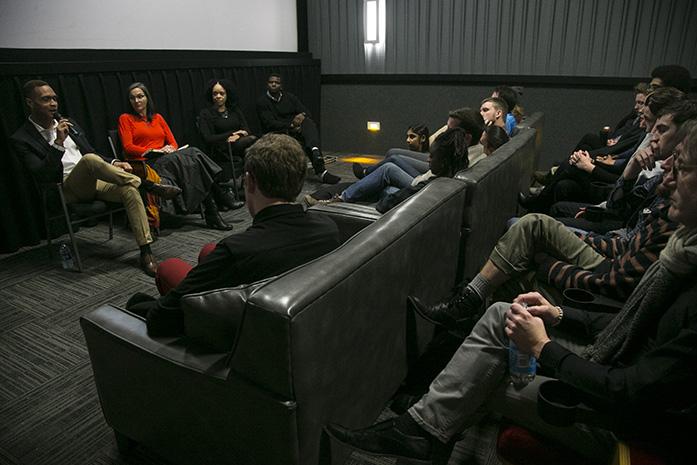A FilmScene screening and discussion focuses on issues in the criminal-justice system.
By Emi Bendler
One in 17 white males will be incarcerated in their lifetime. A third of black males, on the other hand, will spend time behind bars.
This statistic played into the theme of the documentary 13th, shown at Bijou Film Forum Tuesday night at FilmScene, 118 E. College St. The theater was filled with various members of the Iowa City community.
The film goes inside the justice system and exposes the injustices against the minority communities in the United States. Going back to the abolition of slavery, the criminalization of minorities has been prominent issue in American society. Ava DuVernay’s film shows how discrimination grew through the country’s fear of crime.
Amanda Bartlett, the Bijou Film Board’s director of marketing, attributed the high turnout to the opportunity for audience members to discuss the film with three of the four panel members, who were professionals in the fields of African American studies, art, and politics.
“We’re expecting a full house, which is exciting,” Bartlett said before the event.
Robert Crader, an ex-convict who has experienced the criminal-justice system firsthand, also sat on the panel.
Following the film, audience members asked the panel several questions.
One young woman, who was adopted with her brother from Ethiopia and lost him to police brutality, asked the four panelists what she can say to her brother’s friend to help him through and give him hope.
“Love conquers all,” was Crader’s response. He said to stop listening to all of the voices that tell him who he is and create his own self.
Another young man focused on the greed problem the documentary pointed out. In the documentary, many people were incarcerated because the government and corporations could profit from it.
In addition to this, lower-income inmates had a harder time because they had no money to buy the necessities they needed aside from the three meals a day they were provided in prison.
“It really magnifies the connection between race and class,” said panelist Deborah Whaley, a University of Iowa associate professor of American studies.
Crader said, “For a Little Debbie cupcake that you would pay 50 cents for out here, you would pay $1 for in [prison].”
Panelist Rachel Williams, a UI associate professor of gender, women’s, and sexuality studies, noted the health-care issues in American prisons. Williams has spent time with inmates in prison.
“The health care you receive in prison is horrendous,” she said.
She recounted an experience she had with an inmate who came to her and told her that she had a cesarean section, and nobody had followed up with her. When addressing the prison system as a whole, she said, “It is not a healthy system. It is the best system they have created, but it is not a good system.”
This film was the first to be shown in the Bijou Film Forum this semester.
“Bijou Film Forum is our series that presents screenings and discussions of acclaimed and provocative films that seek to engage community members and UI students across all disciplines and fields of study through the art of film,” Bartlett said.
There will be more films shown in the series; they are free to UI students.



